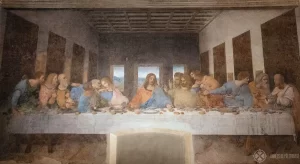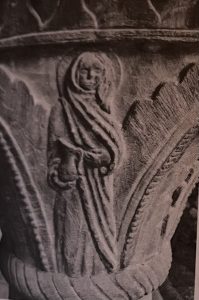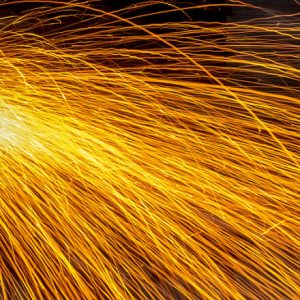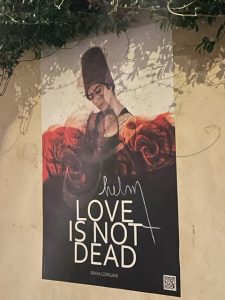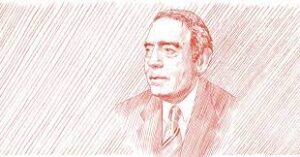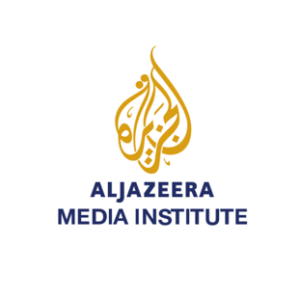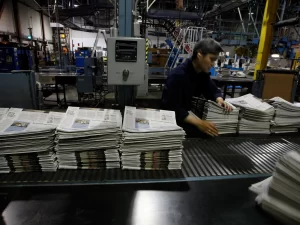Homo Spiritus
Dayle in Limoux – Day #60
September 3, 2022From the church of Saint-Volusien in Foix, constructed in the 12th century, although the original structure was most likely constructed in the 9th. Volusien was a bishop in the regions in the late 5th century. He was persecuted by the Visigoths and placed under house arrest. He died without regaining his freedom.
‘She squatted in from of an old altar.
“Look,” she said pointing to a relief where the paint was partly peeled off. It was the scene from the Last Supper. However, in this painting there was no doubt that the person next to Yeshua was a woman. In contrast to most of the paintings, the one by Leonardo da Vinci being the most well known, in this one Mariam sat to the left of Yeshua instead of to the right which is usually the case. In this painting in the church of Foix she is looking devotedly at her partner. Everyone apart from Mariam, of course, is depicted with a beard.’
‘It may very well be that the Catholic Church in general has had its problems with Mary Magdalen. However, this does not seem to be the case here in the south of France.’
-The Manuscript, pp. 569-570
“We went under the porch supported by a few symbolically decorated pillars, which formed an impressive entrance.
“Take a look at this.”
She pointed to a star of Mariam hanging on a pillar next to us.
“And, here as well.”
“Who?”
“Yeshua and Magdalene!”
Sure enough and here they were one on each side of the same pillar…”
-The Manuscript, pp. 572-573
This book is beyond, truly. A trilogy bound as one book, the hardback, which I have, is only available from the author, Lars Muhl, in the book shop at Rennes-les-Chateau.
Gaining new levels of knowledge and taking so many notes; building bridges between my research from the last seven years for a new heart-based paradigm for journalists, intersecting a radical compassion for a homo spiritus species.
Marianne Williamson posted this earlier today from her essay titled, ‘Growing our Wings.’
When we were kids at school we had textbooks that showed human beings evolving from apes, then transforming over time into homo sapiens. On the left side of the page was a sort of hunched over looking ape, then on the right side of the page was a human being standing erect.
Okay, but I don’t think that’s the whole story; I think one day home sapiens standing erect will be seen as the middle of the page. We’re not done with evolution until we’ve evolved from ape to angel. One day, on the right side of the page there will be a human being having grown wings…
Now I don’t think those wings will be literal, of course. But I think we’re only at maybe the midway point in our evolutionary journey. We have physically evolved, but spiritually we are somewhere between an infant species and something just past barbarian. Evolution is spurring us on but we sure better hurry up.
We’re burning through all that insanity now. We have to or the species will not survive. […] The world is so clearly laboring now – a difficult labor indeed – as we struggle to give birth to the next version of who we are.
We’re not done yet. We’re transforming. No longer can we simply hug the ground. That is not our destiny. We are growing our wings.
Julian Lennon speaks to this in his own way, too, with a new album dropping on the 9th simply titled, ‘Jude’, in reference to the song Paul McCartney wrote for him when his dad, John, and his mum, Cynthia, were divorcing, ‘Hey Jude.’ This is a single from the album, ‘The Lucky Ones.’ #Jude @JulianLennon
Everyone is searching, trying to find a new religion
Some peace of mind,
Don’t wanna let go of all of my intuition
I need a sign ’cause love is blindI feel a change is coming, I know
A new revolution’s knocking on my doorEveryone is hurtin’ tryin’ a find a real solution
Well, you might find that love ain’t blind
The world is burning while we’re dancing in our own pollution
Well, is there time, or did we cross the line?We gotta find a way to get better
The only way through this is together
It’s not too late, so never say neverI know that we’re the lucky ones
Look at us, we fucked up the weather
If we unite, we’ll get through whatever
We need this world to last us forever
I know that we’re the lucky ones✧ * . * ✧ . * . *
. * . * . . ✧ .
✧ ✧ * . * . . *. .
✧ * . . ✧ . * . * .
Today was reading, writing, researching, hanging laundry (ℒℴve ! the scent of clothes after drying on the line…the best…using only the energy from the sun.),
Y
O
G
A
meditations, contemplation, and plotting the next Languedoc adventure. :)
Chapter 4
More from Marianne:
Take a good look at your life right now. If you don’t like something about it, close your eyes and imagine the life you want. Now allow yourself to focus your inner eye on the person you would have to be in order to create your preferred life.
Notice the differences in how you behave and present yourself; allow yourself to spend several seconds breathing in the new image, expanding your energy into this new mold. Hold the image for several seconds and ask the Beloved to imprint it on your subconscious mind. Do that every day for 5 minutes or so. If you share this technique with certain people, the chances are good they’ll tell you that it’s way too simple. It’s up to you what you choose to believe.
B
E
L
I
E
V
E
And for September’s Power Path, a message from Lena.
The main theme for September is: “CRISIS”
The definition of crisis comes from the word “to decide”. It is an intense time or turning point where a decision is made, there is a decisive point, and a change takes place. There is always an action component to crisis and often a need to make a choice that influences a course of action. In a healing crisis, you either get better or worse sometimes depending on that choice. In a financial crisis you may need to make hard decisions that change your usual habits and patterns. In relationship crisis you may be forced to look at some truth and face choices that produce needed change. A health crisis is often a wake-up call to change something significant in your life that puts you on a different path.
When we hear the word crisis it often brings up a negative response. In truth, crisis is often the catalyst for much needed change supporting movement towards necessary and positive evolution. Our physical nature is designed to respond to crisis with reaction and action, the instinctive response of fight or flight. Crisis often brings up fear. If we can work through the fear, there is power on the other side. This month is a good one to work proactively with the theme of crisis and use it as a catalyst for making whatever change is needed instead of being crippled by the fear it may temporarily produce.
Think of this as a month of potential breakthroughs as we are forced to go within for deep reflection and introspection regarding our values, habits, patterns, beliefs and actions. Much of the work this month will be around relationships and our perceptions of who we are, who we are with and what our work here is on this planet. Crisis that affects a community will either bring people closer together or fragment what is ready to reorganize itself differently. Crisis brings truth to the surface that can clear the decks of calcified attitudes and support new insights. Aspects of this month are conducive to clearing the mind of old beliefs and ways of thinking, opening us up to new and more inspired ideas.
As much as the crises occurring this month could be manifested outwardly, the work triggered by them is internal. Even the action component points to internal movement and change as a deep purification of the mind and our beliefs takes place. Crisis is an intense experience brought about by sudden news, a dramatic unexpected event, or some situation that has gathered enough energy to itself that you can no longer ignore it. The only way to deal effectively with crisis is to face it proactively with curiosity, confidence, trust and humor. The worst thing you can do is to withdraw into a fearful state of blame, shame or anger.
This is not an easy month but the end result of your inner process can be extremely rewarding. The key is to work with the influences instead of against them. If crisis comes into your life, watch your reactions. Get to neutral as quickly as possible, don’t take it personally, but do use it as a catalyst to do something differently. Crisis requires flexibility as your decisions may not be ones you usually make. Use curiosity as a proactive way to lean into the crisis with the intention of bringing a creative solution or decision to the process.
We do not expect every moment of this month to be full of crisis, however this is an energy that is permeating much of the common experience, and we as a collective need to move through it proactively beginning with our own inner transformation and positive change. Being in conflict can cause a crisis and the more we can resolve our own inner conflicts the more we can be a positive influence on others. This is a month of taking responsibility for our relationships, for our actions and for our personal experience of crisis.
There will also be periods of heightened awareness, increased intuition, a celebratory sense of gratitude, and rich experiences in relationship, intimacy and connection to spirit. Cherish those times of expansion and beauty, and use them as a point of reference when you find yourself in the trenches of crisis.
Balance is another necessary support this month. Practicing balance between being and doing, between the mind and the heart, and between obsessive overthinking, overcontrolling and over organizing, and the potential chaos of too loose of a container are all important. Use the natural elements as support and try and spend time between inner and outer expressions. It is good to express spiritual needs but maintain order at the same time. A good routine that handles both will be helpful during any crisis. [thepowerpath.com]
Found this on my phone, a random shot wandering the medieval streets of Arles earlier this week.
Thank goodness. :)
Bonne nuit.
♥️
Sunday, February 6th, 2022
February 6, 2022p. 53
“…liberté, égalité, et fraternité triumphed, and here, a place of exchange between English and French thinking, we get to enjoy the spots of peace: literature, friendship, conversation, debate. Long may we enjoy them and may they…instead of guns and grenades…become the weapons of new rebellions.”
p. 49
“The world as we knew it has ended, and it’s time for something entirely innovative.”
From Seth Godin.
In defense of non-interactive media
It doesn’t talk back. It doesn’t beep or update or invite a click. It doesn’t change based on who’s consuming it. It doesn’t interrupt you, and it begs to not be interrupted.
It’s rarer than ever before, and sometimes, we need it.
Agree. Completely. I think all comments across all social media platforms should be muted for six months.We must recalibrate. Let us read, absorb, research…enact media literacy and ease the meanness, vitriol, hateful and polarization with our words. Practice Lectio Divine…contemplative interaction…not words…conversations through meaning and meditation. We need it…indeed. -dayle
From Dan Rather.
We often hear of the tides of history, as if the fate of the world shifts in unison – the rising and lowering of a great sea of fortune. Tides are predictable. They are unstoppable. They are acts of nature. Human affairs, while inextricably tied to planetary forces, are also shaped by the actions we take, and do not take. Our destinies do not move with any great cohesion or coordination. Rather we are more like boats tossed by the accumulation of countless individual waves (to stretch our maritime metaphor), cresting and receding, churning and placid, forceful and gentle. These can be waves that push us backwards, but they can also propel us forward to a better future.
When looking back at the past, it is tempting to see paths as preordained – narratives we neatly tuck into the contextual confines that make them easier to understand. In contrast, the present is always messy. It will only become clearer once we know how it ends, at which point we will be living in a new era of uncertainty.
We can never dismiss the many challenges we face or the threats they pose. They are particularly dire. The list of woes bears repeating and remembering – from the climate crisis, to the ongoing threat to our democratic institutions, to our continued struggle for racial justice, to the threats of war, to the pandemic, and onward.
In the future we may look back and see that one of these forces escalated to a point of even greater dominance, and disaster.
One of the few things I have learned with any certainty over the course of a long life is to be wary of certainty. Those who predict with the most confidence what will happen in the future are often the voices that should be treated with the greatest skepticism. These paragons of certainty invariably are the ones who talk the most and consequently do the least to make a difference.
Substack: Islands of Hope
Both sides…not working now. It’s lazy journalism. -dayle
‘Both sides’ journalism does not always show us the truth
Journalists are bound to tell the truth, not give platforms to positions which are demonstrably wrong in a misguided attempt to be ‘impartial’.
“Flat-earthers are not going to get as much space as people who believe the Earth is round, but very occasionally it might be appropriate to interview a flat-earther. And if a lot of people believed in flat Earth we’d need to address it more.”
The BBC’s director of editorial policy, David Jordan, tried to make a defence of impartiality. Instead, he inadvertently showed us why the dogma is so dangerous.
It’s time to end both-sidesism. For so long, the idea of impartiality has been treated as more a matter of faith than a principle to be debated.
Where does this end? If we’re giving airtime to flat-earthers, then surely Syrian war crimes deniers are entitled to a platform. How about genocide deniers, 9/11 conspiracy theorists, and people who think there’s no climate emergency?
In the UK, the dogma of impartiality led the media to the false equivalence trap during Brexit. Pro-EU campaigners were given their share of airtime, and then the other side said it had “had enough” of listening to experts and fed viewers factually incorrect claims.
On other issues, too, the shrine of impartiality has taken us to dangerous places.
It took the BBC until 2018 to recognise that it wasn’t necessary to host a climate crisis denier to balance a debate about the impending environmental emergency. The BBC briefing note read:
“To achieve impartiality, you do not need to include outright deniers of climate change in BBC coverage, in the same way you would not have someone denying that Manchester United won 2-0 last Saturday. The referee has spoken.”
But that was a long three years ago. Before COVID conspiracy theories and leaders in the UK and US began regularly mixing fact with fiction.
Why is impartiality valued more highly than truth? We know that we’re failing as journalists when around 25 percent of people avoid the news in the UK, and one of the main reasons is because they can’t trust the news to be true.
Journalists are not naive storytellers incapable of discerning fact from fiction.
If we don’t stop giving a platform to things we know are false, how are we going to win back that trust?
Ironically, it’s the BBC that is leading the way in the UK’s fight against fake news: they have a specialist reporter covering disinformation online, and in 2021, they appointed their first health disinformation reporter.
I know what you’re thinking: give them a platform, and then robustly challenge them. Let their arguments crumble in the face of a tough line of questioning. Here’s the danger with impartiality purists: simply repeating false claims – even if it’s challenged – can push people to believe the false statement.
This isn’t a manifesto for throwing impartiality out of the window. We’re not campaigners or activists. We shouldn’t have an agenda.
But we’re also not naive storytellers incapable of discerning fact from fiction. The New York Times and many other publications did readers a service when they called former President Donald Trump’s lies, lies.
Fairness doesn’t mean giving a platform to factual inaccuracies just because they’re popular. That’s what Twitter is for.
There are not always two sides to every story.
Sakhr Al-Makhadhi is Executive Producer for AJ+
Remember reading the paper?
by Scott Simon
NPR
Image: A worker at a San Francisco Chronicle printing plant arranges stacks of freshly printed newspapers in 2007. Its digital version, like that of so many newspapers’, is behind a paywall. -Justin Sullivan/Getty Images
The road to free information and opinions seems to run into a lot of paywalls.
Want to finish reading an article? You can, but only if you subscribe for just $1 for 3 months, which becomes $11.99 a month thereafter, and into perpetuity, until your credit card expires. Even if it’s after you do.
I have a strong, even personal interest in paying journalists fairly. But the cost most people have to pay these days if they want to try to stay informed and enrich their minds with a range of opinions is pretty steep.
It’s become harder to read more than an article or two in most publications, which may no longer be the word. News sites, from The New York Times and The Washington Post to The Des Moines Register, insist you subscribe. So do Ebony, The New Yorker, The Economist, Rolling Stone and opinion journals, including The Nation and National Review, and sports-reporting sites. And of course, there are proliferating newsletters and extra-access-plus plans, as news broadcasters begin their own subscription services. They don’t crave an audience, so much as what they call a “customer base.”
“You can’t do much web grazing of quality content these days without a paywall clanging shut on you,” Jack Shafer wrote last year in Politico. “What delights publishers about subscriptions is what everybody from Amazon to Spotify to the Dollar Shave Club to Netflix love — the annuity-like reliability of steady revenue.”
But the cost of inducing people to subscribe is to make news, information and a range of opinions available to only those who have the means to afford and receive them online. This skews the audience toward what Nikki Usher, a University of Illinois College of Media associate professor, calls the “rich, white, and blue,” as in left-leaning.
The political and social divides, which so many decry, may begin between those who can and those who can’t afford access to a wide range of fact-checked, accurate information.
Disinformation, of course, is utterly free.
Newspapers and magazines often got ink on your fingers. But they were cheap. Anyone with pocket change, rich, poor, students or job-seekers, could buy a copy of a magazine with Princess Diana or Oprah Winfrey on the cover or a newspaper when the headline said MAN WALKS ON MOON, or, yes, HEADLESS BODY IN TOPLESS BAR.
The internet has made news and views of all kinds, from all over the world, available on screens we can keep in our pockets. But so many paywalls have pulled costly shades over those screens.
https://www.npr.org/2022/02/05/1078377406/opinion-remember-reading-the-paper
We need an opportunity to reestablish and recalibrate the purpose and necessity of the Fourth Estate. What should the institution’s moral compass be based on the ideals of the U.S. Founders? The U.S. Founders believed a free press vital to democratic debate. So how did the current contemporary news culture evolve into a climate of disinformation and false news? Further, how did an institution created for public service evolve into an influential economic profit platform more destructive than instructive? Free Press co-founder, author and professor Robert McChesney is an activist for government subsidized non-profit media, a model the United States Founders had encouraged for a free press. He believes the Founders did not “authorized a corporate-run, profit-motivated, commercially driven media system with the First Amendment.” Corporate owned media is complicit in misinformation, and disinformation, for ratings, clicks and profits. This must change. And the change begins with our consumer information behaviors and tech media regulation. Democracy may die in darkness, but right now it’s happening in broad daylight. The pillar of the Fourth Estate is crumbling. -dayle
“Some would say that humanity is destined for self-destruction; that our history of lethal violence towards our own kind has programmed us to be fearful, suspicious, revengeful and greedy; and, despite our modern age, this programming now threatens our well-being on a global scale never witnessed before. But does it have to be this way? Can we not consciously evolve into a different kind of human?”
-Helen Marriott
I propose a journalism renaissance based on spiritual companioning, or homo spiritus, and radical compassion (Khen Lampert), deep empathy for other within democratic social process, a heart-based journalism paradigm in necessary community; a Fourth Estate defined in the third space of spirit, love, dignity, and humanity. -dayle

